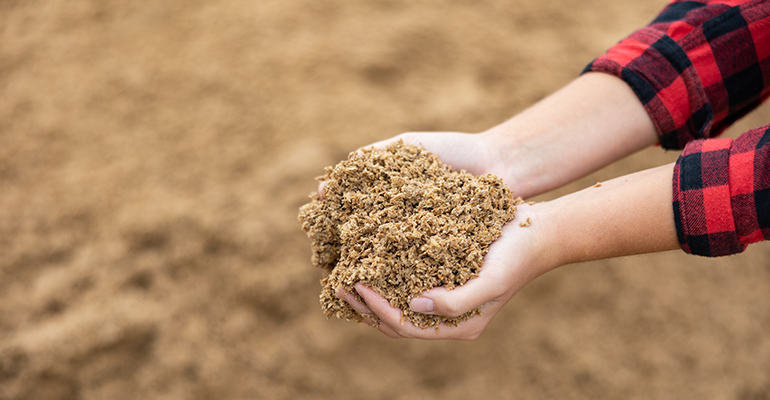News
Unlocking the prebiotic benefits of unwanted industry side streams
16 Mar 2023
Unwanted by-products from the food and beverage industry can be transformed into prebiotics that provide sought-after health benefits, without harming the earth. BCD Bioscience and ReGrained are two startups making waves in this space.
Prebiotics, defined by the International Scientific Association for Probiotics and Prebiotics as "a substrate that is selectively utilized by host microorganisms conferring a health benefit,” promote the growth of beneficial microbiota in the gut, and commonly take the form of fibres. Not all fibres however are prebiotics. Prebiotics act as food sources for the gut microbiota and aid in the production short-chain fatty acids by fermenting dietary fibres.

To capitalise on the growing consumer awareness and interest in gut and digestive health and the microbiome, brands are leveraging prebiotic ingredients in better-for-you products. Despite representing less than 1% of all launches, prebiotic claims in global food and drink launches rose by 42% from 2016 to 2020, according to Mintel.
Sustainability is also an increasingly important consideration for many consumers. According to Cargill’s recent global FATitudes survey, over half (55%) of consumers are more likely to buy a packaged food item if it carries a sustainability claim, up from 51% in 2019.
Upcycling unwanted industry side streams such as spent brewers’ grain and pomegranate pomace into health-benefit-wielding ingredients, such as prebiotics, is one way that brands can appeal to both the digestive wellness and sustainability trends.
Producing precision prebiotics from pomegranate pomace
Californian-headquartered startup BCD Bioscience has developed a revolutionary approach to producing what it calls “precision prebiotics”: highly specified, customised prebiotics tailored to the specific health needs of individuals. The company’s proprietary process uses specially designed algorithms to identify and characterise an individual’s unique microbial profile, allowing it to create prebiotic combinations that deliver targeted health benefits on areas such as immunity, cardiometabolic disease, and gut inflammation.
“We're trying to actually reinvent prebiotics and instead of going from a standpoint of, ‘We've developed a prebiotic. Let's see what it does,’ we're [...] going after specific applications and finding the right prebiotic for that application,” Matt Amicucci PhD, co-founder and vice president of R&D told Vitafoods Insights.
BCD Bioscience’s process converts fibre or polysaccharides taken from natural raw materials like fruit, vegetables, or agri-food side streams, into smaller, more bioactive fragments, known as oligosaccharides. Using a phenotypic screening process and taking into account the individual’s microbiome and health conditions, it then tests how different fibres affect the gut microbiome, to develop a custom prebiotic blend that addresses specific health needs.
The final ingredient is easily formulated and allows brands to add fibre-related health claims to their products, whilst maintaining a clean label.
“One of the features of the process is that [...] you enhance the ‘formulateability’ – meaning that the [oligosaccharides] are highly soluble and can be formulated like sugar,” said Amicucci.
“They don't have the same sweetness as sugar, but they provide a lot of those binding and bulking [properties] and things like that. But they retain all of those biological properties that make fibre good for you.”
Through a public partnership with pomegranate producer The Wonderful Company, the startup is experimenting with oligosaccharides derived from pomegranate pomace, a by-product of the juicing industry.
Transforming spent brewers’ grain to support holistic health
Another company harnessing the power of upcycled industry side-streams, US foodtech startup ReGrained transforms brewers’ spent grain into a barley-based functional flour for use by food manufacturers. Working in partnership with the United States Department of Agriculture (USDA), the startup developed a patented and highly efficient thermo-mechanical process for stabilising grain.
 © AdobeStock/JackF
© AdobeStock/JackF
The end-product is a soluble powder similar to toasted flour with a nutty, caramel-like flavour that packs a nutritional punch, containing 3.4 times more dietary fibre than wheat flour and twice as much protein as oat flour.
“We’re a food tech company and we use the technology we developed to make new, innovative ingredients through edible upcycling,” Dan Kurzrock, founder & CEO of Upcycled Food, ReGrained parent company told Fi Global Insights.
“Essentially, we mapped out all the food that is over-looked and under-utilised in the food system, identified how much nutritional value it had and put it to use.”
The ingredient is also a source of prebiotic fibre, beneficial for gut health, and containing micronutrients such as iron, magnesium, manganese, zinc, and phosphorous.
Tapping into the holistic health trend, the startup produces snacks including granola bars and extruded puffs, as well as selling the powder directly to manufacturers. The fact that the beer-making process uses up the natural sugars in the grain means the powder is low in sugar.
Co-developed via a partnership with multinational ingredient supplier Kerry, ReGrained launched its first value-added product in July last year. The plant-based protein crisp bar, made from the startup’s upcycled flour, contains 40% protein, 16% fibre, and is vegan and kosher.
“Our food manufacturer partners come to us searching for R&D expertise and ingredient solutions for new sustainable foods. Value-added ingredient applications like our new crisp offer a platform for finished product innovation, thus enabling more partners to have a bigger impact,” said Kurzrock.
Related news

Oat Barista: Innovation for game-changing beverages
20 Nov 2025
Oat Barista is a clean label, sustainable, and innovative drink base specifically designed to create the perfect foam in one single ingredient.
Read more
How younger consumers are redefining ingredient choices and rejecting brand loyalty
18 Nov 2025
Gen Z and millennial consumers’ preferences for transparency, functionality, and purpose are “redefining the very nature of consumption itself”, says SPINS.
Read more
Hybrid formats and flexible positioning to disrupt category norms in 2026
17 Nov 2025
Trend forecasters expect food and drink to move more fluidly across occasions, functions, and formats as consumers seek versatility, novelty, and convenience.
Read more
Danone highlights digestive health as potential ‘tipping point’ for food industry
13 Nov 2025
Danone is betting on a food industry “tipping point” that will bloat the market for healthy products, particularly those related to gut health.
Read more
New UPF standard hoped to offer consumers ‘coherence and clarity’
10 Nov 2025
Ingredients companies are being urged to enter “a new era of partnership and innovation” following the launch of the industry’s first non-UPF verification scheme.
Read more
Faravelli at Fi Europe: Showcasing FARA® functional solutions for food and nutra
28 Oct 2025
At Fi Europe 2025 in Paris (stand 72M39), Faravelli showcases FARA® Customized Functional Solutions and a wide ingredient portfolio for food and nutra – delivering quality, innovation, and expertise.
Read more
Agrigum Redefined FIBER
27 Oct 2025
Agrigum has transformed gum acacia into a natural, science-backed fibre that supports gut health, sustainability, and innovation across global food and nutrition applications.
Read more
Expanding boundaries in food & beverage innovation
23 Oct 2025
IMCD and FrieslandCampina Professional expand partnership to deliver Kievit® across EMEA, enabling brands to enhance quality and accelerate time-to-market for tomorrow’s food & beverage creations.
Read more
Amazon Grocery launch aims to balance quality with affordability
22 Oct 2025
Global e-commerce giant Amazon has introduced a new private-label food brand, combining existing Amazon Fresh and Happy Belly products with new everyday items.
Read more
Powerade enters hydration space with launch of Power Water
21 Oct 2025
Coca-Cola’s Powerade brand has launched a zero-sugar, electrolyte-enhanced functional water, marking the brand's entry into the hydration space.
Read more